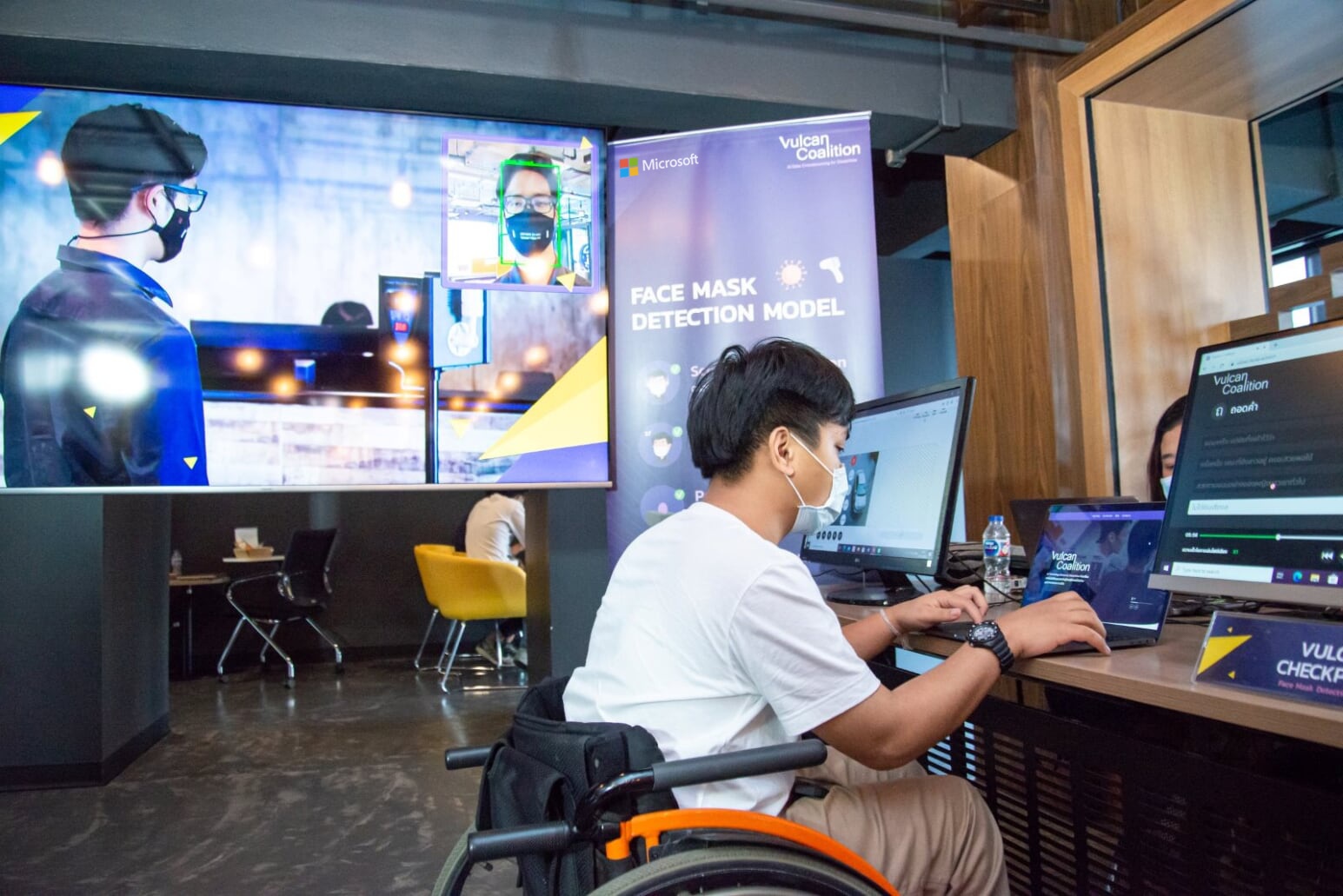- Cloud resources provided to Vulcan Coalition to facilitate AI opportunities to people with disabilities through AI for Accessibility Virtual Hackathon
- AI for Earth grant powers Faculty of Engineering, Chulalongkorn University to set sights on AI-driven air pollution awareness
- Bringing data and AI platform for health to life with Ministry of Public Health and Thai startup Feedback180 in the fight against COVID-19
Bangkok, 24 November 2020 – Microsoft’s global mission to empower every person and every organization to achieve more continues to grow in scope and diversity with local initiatives in Thailand that harness the power of artificial intelligence to inspire impactful innovations for better and safer living. These initiatives are rooted in the worldwide ‘AI for Good’ program, which brings the full technological capabilities of the Microsoft cloud and AI platforms to make our world more sustainable and accessible to everyone.
Founded in 2018, AI for Good currently encompasses five aspects of impact:
- AI for Earth – Solving global environmental challenges
- AI for Health – Improving health of people and communities
- AI for Accessibility – Amplifying the capabilities of people with disabilities
- AI for Humanitarian Action – Addressing challenges in disaster response, refugees, displaced people, human rights, and the needs of women and children
- AI for Cultural Heritage – Preserving and enriching cultural heritage around the world
Mr. Dhanawat Suthumpun, Managing Director, Microsoft (Thailand) Limited, said, “Thailand’s AI journey has only just begun, and there are endless possibilities still to be explored. While the impact of AI on how businesses operate and grow is undeniable, we believe that the technology has even more potential to make our world more sustainable, ensure more equal opportunities for everyone, and make lives better everywhere. With AI for Good, we are turning this belief to reality by empowering local thinkers with technologies that bring their vision to life in a practical and impactful way.”
AI for Accessibility: Vulcan Coalition brings AI opportunities to people of all abilities
Vulcan Coalition, a social enterprise dedicated to AI data crowdsourcing for people with disabilities, is founded on the idea that every person has something special to offer. This idea was the catalyst behind the company’s latest project – a hardware and software solution that automates the health check and venue check-in processes for visitors with disabilities – including automatic visual detection of masks powered by AI on the Microsoft Azure cloud. Recognizing the need for large amounts of visual data to train an AI for this task, the Vulcan team turned to the hard of hearing to harness their distinctive visual attention capabilities in training the system through the Vulcan Data Labeling Platform.
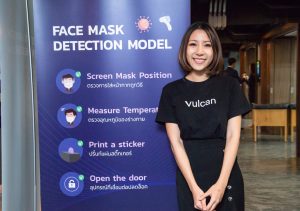 Ms. Methawee Thatsanasateankit, Chief Executive Officer, Vulcan Coalition, said, “In Thailand, AI development still faces limitations from inadequate volumes of data required to ensure an AI’s precision and reliability in real-world situations. By bringing people with disabilities into the fold through our AI Trainers by Disabilities program, we can make up for this deficit and reduce the gap in employment opportunities for them, ultimately making society more inclusive on both ends of our solutions. In order to drive such an impactful change, we need the right technology to realize our vision and the right partners from both the public and private sectors to ensure that the opportunities we provide can reach those who need it most.”
Ms. Methawee Thatsanasateankit, Chief Executive Officer, Vulcan Coalition, said, “In Thailand, AI development still faces limitations from inadequate volumes of data required to ensure an AI’s precision and reliability in real-world situations. By bringing people with disabilities into the fold through our AI Trainers by Disabilities program, we can make up for this deficit and reduce the gap in employment opportunities for them, ultimately making society more inclusive on both ends of our solutions. In order to drive such an impactful change, we need the right technology to realize our vision and the right partners from both the public and private sectors to ensure that the opportunities we provide can reach those who need it most.”
To build upon this solution’s capabilities, Vulcan Coalition has joined forces with the Digital Economy Promotion Agency (DEPA) and Thai companies across various industries to sign a memorandum of understanding (MoU) to equip people with disabilities with necessary digital skills and tools that help them thrive in the digital era as AI trainers.
Furthermore, the Vulcan team was named the winner of the Microsoft AI for Accessibility Virtual Hackathon in Thailand. The competition challenged Microsoft’s business partners, independent developers, startups, and universities across 9 countries and regions in Asia Pacific to reimagine how the lives of people with disabilities can be improved in 3 key aspects:
- Safety and convenience in everyday living
- Communication and emotional connection
- Greater employment opportunities.
After in-depth deliberation by a panel of judges from Microsoft Thailand, Ministry of Social Development and Human Security, Thailand Association of the Blind, Redemptorist Foundation for the Development of Persons with Disabilities, and Digital Economy Promotion Agency (depa), Vulcan’s solution emerged as the winning choice. In addition to a cash prize, the team will also receive other special rewards aimed at further supporting the project’s development – including mentoring and support for an AI for Good grant application, fast-tracked listing on the Microsoft Azure Marketplace, and more.
AI for Earth: “Sensor for All” initiative by Chulalongkorn University enters third year of journey towards cleaner air in Thailand
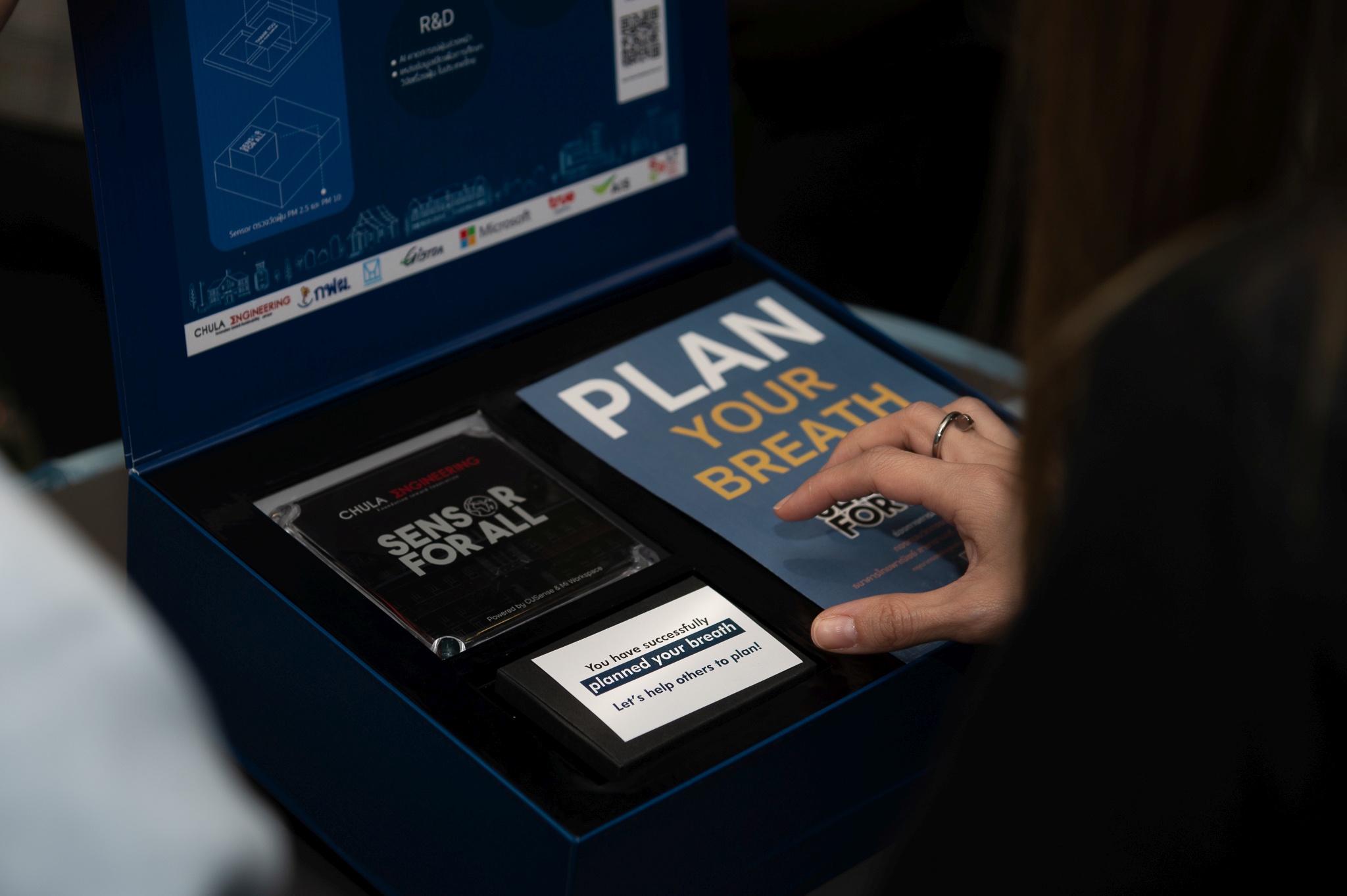 Thailand’s struggles with air pollution have become very well-documented in recent years. Every winter now brings the familiar sight of brown or grey smog hanging low on Bangkok’s horizons, and face masks were already a fixture in urban living even before the coronavirus pandemic.
Thailand’s struggles with air pollution have become very well-documented in recent years. Every winter now brings the familiar sight of brown or grey smog hanging low on Bangkok’s horizons, and face masks were already a fixture in urban living even before the coronavirus pandemic.
Driven by the mandate to innovate towards sustainability, Chulalongkorn University’s Faculty of Engineering established the Sensor for All initiative to bring together expertise and resources from a diverse range of industries and sectors to tackle the situation together. In 2018, Sensor for All became an official grantee of Microsoft’s AI for Earth program. Over the following two years, the Sensor for All team received USD 30,000 in cloud computing resources to support the project’s development – including a live air quality data dashboard that operates on the Microsoft Azure cloud platform.
For its third year, Sensor for All will continue to receive support from the AI for Earth program as it looks to expand the sensor network to 500 sites nationwide. The sensor units will also undergo detailed calibration to ensure greater accuracy in separating actual dust particles from other particulates such as water droplets. Furthermore, the official Sensor for All mobile application will make its debut on mobile platforms soon.
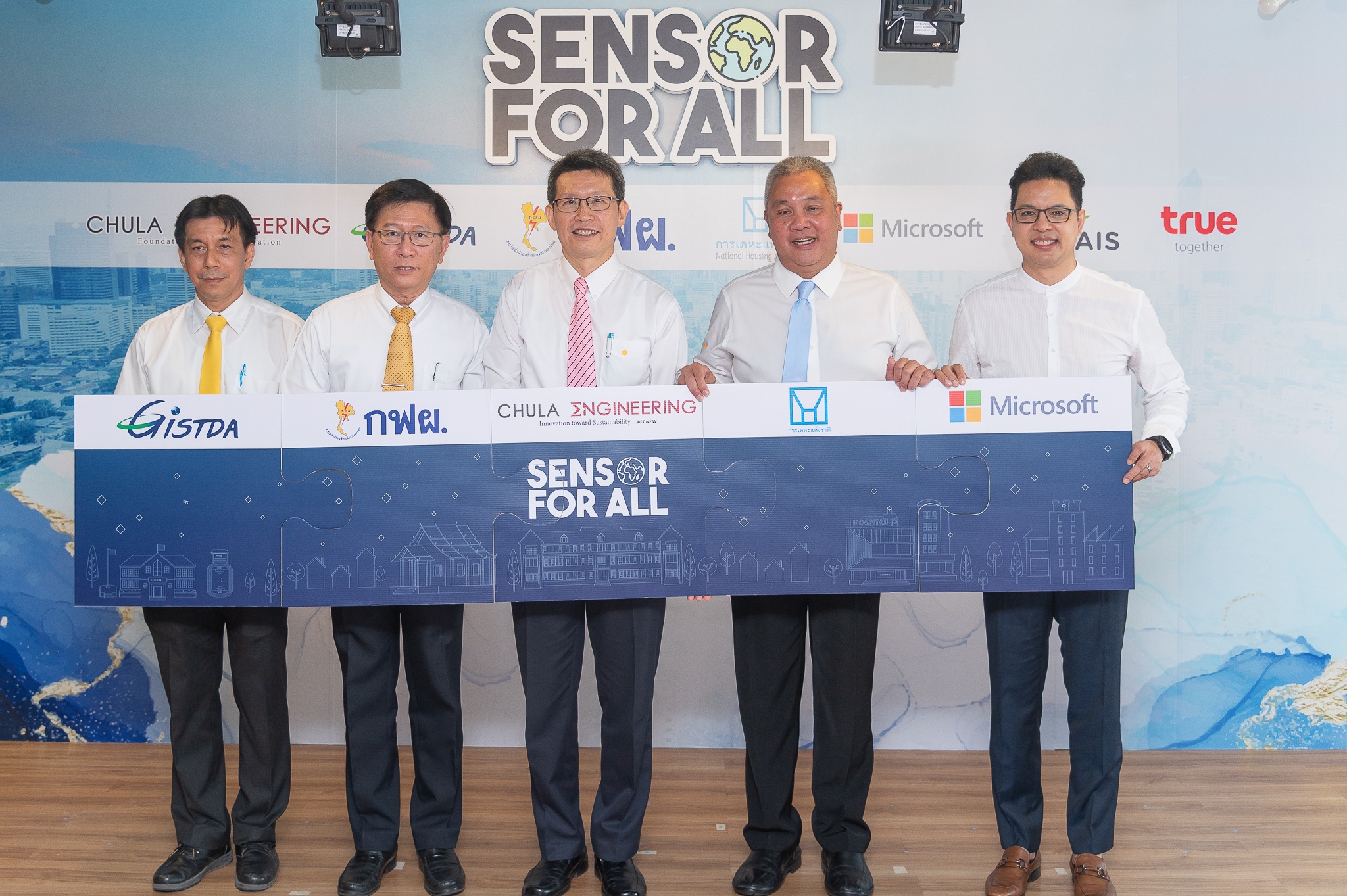 Faculty Dean Prof. Supot Teachavorasinskun, D.Eng., said, “The Microsoft cloud provides a platform for us to expand Sensor for All’s capabilities in many ways over the coming year. In addition to reporting real-time AQI, PM 2.5 and PM 10 measurements, we are working on a more precise way to estimate exposure to air pollution for each individual user. Furthermore, we will be utilizing AI capabilities to forecast air pollution levels over the coming days and help everyone better prepare and protect themselves.”
Faculty Dean Prof. Supot Teachavorasinskun, D.Eng., said, “The Microsoft cloud provides a platform for us to expand Sensor for All’s capabilities in many ways over the coming year. In addition to reporting real-time AQI, PM 2.5 and PM 10 measurements, we are working on a more precise way to estimate exposure to air pollution for each individual user. Furthermore, we will be utilizing AI capabilities to forecast air pollution levels over the coming days and help everyone better prepare and protect themselves.”
“The goal of AI for Earth is to put the power of cloud and AI into the hands of researchers and technologists working to protect our planet our community, and Sensor for All is an excellent example of research and development works with genuine impact on not only the environment but also everyday life,” said Dhanawat. “The program’s expansion this year will give us access to locally sourced data with levels of detail and immediacy that only AI can effectively take advantage of. This will allow us to better understand its cause and open up new possibilities to bring cleaner air back to Thailand.”
Globally, Microsoft has set ambitious goals for long-term sustainability with commitments to achieve carbon negative and water positive statuses by 2030. Furthermore, its data and digital technologies are being put to work to aggregate worldwide environmental data for the development of a “Planetary Computer” that will provide newfound insights into ecosystems around us and support biodiversity conservation efforts everywhere.
AI for Health: Ministry of Public Health harnesses power of data to combat COVID-19 with greater agility in resource management
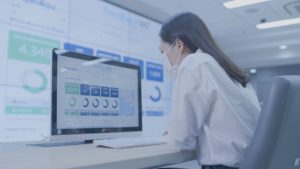 Recently, Microsoft supported Thai startup Feedback180 – an expert in business data analytics – to develop a central dashboard that tracks data on medical equipment, supplies, and personnel nationwide. This enables the authorities to immediately make decisions based on accurate, detailed data to curb the spread of COVID-19, while hospitals and related organizations in the field can better respond to changing circumstances in each day.
Recently, Microsoft supported Thai startup Feedback180 – an expert in business data analytics – to develop a central dashboard that tracks data on medical equipment, supplies, and personnel nationwide. This enables the authorities to immediately make decisions based on accurate, detailed data to curb the spread of COVID-19, while hospitals and related organizations in the field can better respond to changing circumstances in each day.
The dashboard is based on Power BI, a Microsoft data analytics tool, and runs on the Microsoft Azure cloud for maximum performance and flexibility. In addition to its collection of accurate, up-to-date data, the system can also analyze patient condition data to provide predictive assessments that help local hospitals prepare resources necessary to save lives.
For more on the dashboard, visit the Microsoft Thailand News Center or watch the project video here.

